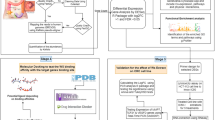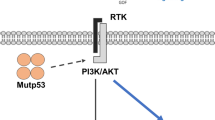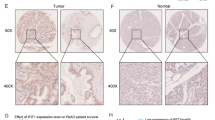Abstract
Cyclin-dependent kinase 5 (Cdk5) functions as a tumor promoter in various types of cancer. Cdk5 is overexpressed in breast cancer patients. The prognostic significance of the Cdk5 gene and its expression in breast cancer were analyzed using various bioinformatic tools. Cdk5 gene expression in different breast cancer subtypes was analyzed using the Oncomine, UALCAN, and bcGenExMiner v4.2 websites. The correlation between Cdk5 mRNA expression and promoter methylation was established using TCGA datasets from the UCSC Xena and UALCAN websites. The relationship between Cdk5 promoter methylation and different clinicopathological parameters in breast cancer patients was determined using UALCAN. Cdk5 expression is associated with various clinicopathological parameters, such as estrogen receptor, progesterone receptor, the basal-like subtype, and triple-negative breast cancer, which was analyzed using bcGenExMiner v4.2. Kaplan–Meier plotter revealed high Cdk5 expression and poor survival in breast cancer patients. In addition, a list of genes that are coexpressed with Cdk5 in breast cancer was identified from the UALCAN website. From that list, we observed that Fas-activated serine/threonine kinase (FASTK) has a predominant positive correlation with Cdk5 in breast cancer. The UCSC Xena and bcGenExMiner v4.2 websites were used to confirm the correlation between Cdk5 and FASTK. Cdk5 overexpression might induce malignancies and is associated with a poor prognosis in breast cancer patients through FASTK. Therefore, Cdk5 might act as a biomarker to predict the prognosis of breast cancer.






Similar content being viewed by others
References
Al-Hajj M, Wicha MS, Benito-Hernandez A, Morrison SJ, Clarke MF (2003) Prospective identification of tumorigenic breast cancer cells. Proc Natl Acad Sci 100(7):3983–3988
Bray F, Ferlay J, Soerjomataram I, Siegel RL, Torre LA, Jemal A (2018) Global cancer statistics 2018: GLOBOCAN estimates of incidence and mortality worldwide for 36 cancers in 185 countries. CA Cancer J Clin 68(6):394–424
Chan KT, Cortesio CL, Huttenlocher A (2009) FAK alters invadopodia and focal adhesion composition and dynamics to regulate breast cancer invasion. J Cell Biol 185(2):357–370
Chandrashekar DS, Bashel B, Balasubramanya SAH, Creighton CJ, Ponce-Rodriguez I, Chakravarthi BVSK et al (2017) UALCAN: a portal for facilitating tumor subgroup gene expression and survival analyses. Neoplasia 19(8):649–658. https://doi.org/10.1016/j.neo.2017.05.002
Chen WX, Yang LG, Xu LY, Cheng L, Qian Q, Sun L et al (2019) Bioinformatics analysis revealing prognostic significance of RRM2 gene in breast cancer. Biosci Rep 39(4):BSR20182062
Cicero S, Herrup K (2005) Cyclin-dependent kinase 5 is essential for neuronal cell cycle arrest and differentiation. J Neurosci 25(42):9658–9668
Demelash A, Rudrabhatla P, Pant HC, Wang X, Amin ND, McWhite CD et al (2012) Achaete-scute homologue-1 (ASH1) stimulates migration of lung cancer cells through Cdk5/p35 pathway. Mol Biol Cell 23(15):2856–2866
Demetrick D, Zhang H, Beach D (1994) Chromosomal mapping of human CDK2, CDK4, and CDK5 cell cycle kinase genes. Cytogenet Genome Res 66(1):72–74
Dhavan R, Tsai L-H (2001) A decade of CDK5. Nat Rev Mol Cell Biol 2(10):749
Eggers JP, Grandgenett PM, Collisson EC, Lewallen ME, Tremayne J, Singh PK et al (2011) Cyclin-dependent kinase 5 is amplified and overexpressed in pancreatic cancer and activated by mutant K-Ras. Clin Cancer Res 17(19):6140–6150
Fan L, Strasser-Weippl K, Li J-J, St Louis J, Finkelstein DM, Yu K-D et al (2014) Breast cancer in China. Lancet Oncol 15(7):e279–e289
Feldmann G, Mishra A, Hong S-M, Bisht S, Strock CJ, Ball DW et al (2010) Inhibiting the cyclin-dependent kinase CDK5 blocks pancreatic cancer formation and progression through the suppression of Ras-Ral signaling. Can Res 70(11):4460–4469
Goldman M, Craft B, Hastie M, Repečka K, McDade F, Kamath A et al (2019) The UCSC Xena platform for public and private cancer genomics data visualization and interpretation. bioRxiv. https://doi.org/10.1101/326470
Gomez-Niño A, Docio I, Prieto-Lloret J, Simarro M, de la Fuente MA, Rocher A (2018) Mitochondrial complex I dysfunction and peripheral chemoreflex sensitivity in a FASTK-deficient mice model. In: Gauda EB, Monteiro ME, Prabhakar N, Wyatt C, Schultz HD (eds) Arterial chemoreceptors. Springer, Berlin, pp 51–59
Goodyear S, Sharma MC (2007) Roscovitine regulates invasive breast cancer cell (MDA-MB231) proliferation and survival through cell cycle regulatory protein cdk5. Exp Mol Pathol 82(1):25–32
Györffy B, Lanczky A, Eklund AC, Denkert C, Budczies J, Li Q et al (2010) An online survival analysis tool to rapidly assess the effect of 22,277 genes on breast cancer prognosis using microarray data of 1,809 patients. Breast Cancer Res Treat 123(3):725–731
Hanahan D, Weinberg RA (2011) Hallmarks of cancer: the next generation. Cell 144(5):646–674
Hsu F-N, Chen M-C, Chiang M-C, Lin E, Lee Y-T, Huang P-H et al (2011) Regulation of androgen receptor and prostate cancer growth by cyclin-dependent kinase 5. J Biol Chem 286(38):33141–33149
Hsu F-N, Chen M-C, Lin K-C, Peng Y-T, Li P-C, Lin E et al (2013) Cyclin-dependent kinase 5 modulates STAT3 and androgen receptor activation through phosphorylation of Ser727 on STAT3 in prostate cancer cells. Am J Physiol-Endocrinol Metab 305(8):E975–E986
Jézéquel P, Campone M, Gouraud W, Guérin-Charbonnel C, Leux C, Ricolleau G et al (2012) bc-GenExMiner: an easy-to-use online platform for gene prognostic analyses in breast cancer. Breast Cancer Res Treat 131(3):765–775. https://doi.org/10.1007/s10549-011-1457-7
Jézéquel P, Frénel JS, Campion L, Guérin-Charbonnel C, Gouraud W, Ricolleau G et al (2013) bc-GenExMiner 3.0: new mining module computes breast cancer gene expression correlation analyses. Database. https://doi.org/10.1093/database/bas060
Khan NS, Khan P, Ansari MF, Srivastava S, Hasan GM, Husain M et al (2018) Thienopyrimidine-chalcone hybrid molecules inhibit Fas-activated serine/threonine kinase: an approach to ameliorate antiproliferation in human breast cancer cells. Mol Pharm 15(9):4173–4189
Liang Q, Li L, Zhang J, Lei Y, Wang L, Liu D-X et al (2013) CDK5 is essential for TGF-β1-induced epithelial-mesenchymal transition and breast cancer progression. Sci Rep 3:2932
Liebl J, Weitensteiner SB, Vereb G, Takács L, Fürst R, Vollmar AM et al (2010) Cyclin-dependent kinase 5 regulates endothelial cell migration and angiogenesis. J Biol Chem 285(46):35932–35943
Lin H, Juang J-L, Wang PS (2004) Involvement of Cdk5/p25 in digoxin-triggered prostate cancer cell apoptosis. J Biol Chem 279(28):29302–29307
Lindqvist J, Imanishi SY, Torvaldson E, Malinen M, Remes M, Örn F et al (2015) Cyclin-dependent kinase 5 acts as a critical determinant of AKT-dependent proliferation and regulates differential gene expression by the androgen receptor in prostate cancer cells. Mol Biol Cell 26(11):1971–1984
Liu R, Tian B, Gearing M, Hunter S, Ye K, Mao Z (2008) Cdk5-mediated regulation of the PIKE-A-Akt pathway and glioblastoma cell invasion. Proc Natl Acad Sci 105(21):7570–7575
Liu J-L, Wang X-Y, Huang B-X, Zhu F, Zhang R-G, Wu G (2011) Expression of CDK5/p35 in resected patients with non-small cell lung cancer: relation to prognosis. Med Oncol 28(3):673–678
Lou W, Ding B, Fan W (2019) High expression of pseudogene PTTG3P indicates a poor prognosis in human breast cancer. Mol Ther Oncolytics 14:15–26
Luo M, Guan J-L (2010) Focal adhesion kinase: a prominent determinant in breast cancer initiation, progression and metastasis. Cancer Lett 289(2):127–139
Nagy Á, Lánczky A, Menyhárt O, Győrffy B (2018) Validation of miRNA prognostic power in hepatocellular carcinoma using expression data of independent datasets. Sci Rep 8(1):9227. https://doi.org/10.1038/s41598-018-27521-y
NavaneethaKrishnan S, Rosales JL, Lee K-Y (2018) Loss of Cdk5 in breast cancer cells promotes ROS-mediated cell death through dysregulation of the mitochondrial permeability transition pore. Oncogene 37(13):1788
Nikolic M, Dudek H, Kwon YT, Ramos Y, Tsai L-H (1996) The cdk5/p35 kinase is essential for neurite outgrowth during neuronal differentiation. Genes Dev 10(7):816–825
Pozo K, Bibb JA (2016) The emerging role of Cdk5 in cancer. Trends Cancer 2(10):606–618
Rhodes DR, Yu J, Shanker K, Deshpande N, Varambally R, Ghosh D et al (2004) ONCOMINE: a cancer microarray database and integrated data-mining platform. Neoplasia 6(1):1–6
Rhodes DR, Kalyana-Sundaram S, Mahavisno V, Varambally R, Yu J, Briggs BB et al (2007) Oncomine 3.0: genes, pathways, and networks in a collection of 18,000 cancer gene expression profiles. Neoplasia 9(2):166–180
Rosales JL, Lee KY (2006) Extraneuronal roles of cyclin-dependent kinase 5. BioEssays 28(10):1023–1034
Saha SK, Jeong Y, Cho S, Cho S-G (2018) Systematic expression alteration analysis of master reprogramming factor OCT4 and its three pseudogenes in human cancer and their prognostic outcomes. Sci Rep 8(1):14806
Saha SK, Islam SR, Kwak KS, Rahman MS, Cho SG (2019) PROM1 and PROM2 expression differentially modulates clinical prognosis of cancer: a multiomics analysis. Cancer Gene Ther 1:1–21
Søes S, Daugaard IL, Sørensen BS, Carus A, Mattheisen M, Alsner J et al (2014) Hypomethylation and increased expression of the putative oncogene ELMO3 are associated with lung cancer development and metastases formation. Oncoscience 1(5):367
Sonoda Y, Matsumoto Y, Funakoshi M, Yamamoto D, Hanks SK, Kasahara T (2000) Anti-apoptotic role of focal adhesion kinase (FAK) Induction of inhibitor-of-apoptosis proteins and apoptosis suppression by the overexpression of FAK in a human leukemic cell line, HL-60. J Biol Chem 275(21):16309–16315
Strock CJ, Park J-I, Nakakura EK, Bova GS, Isaacs JT, Ball DW et al (2006) Cyclin-dependent kinase 5 activity controls cell motility and metastatic potential of prostate cancer cells. Can Res 66(15):7509–7515
Yamashita K, Upadhyay S, Osada M, Hoque MO, Xiao Y, Mori M et al (2002) Pharmacologic unmasking of epigenetically silenced tumor suppressor genes in esophageal squamous cell carcinoma. Cancer Cell 2(6):485–495
Zeng J, Xie S, Liu Y, Shen C, Song X, Zhou G-L et al (2018) CDK5 functions as a tumor promoter in human lung cancer. J Cancer 9(21):3950
Author information
Authors and Affiliations
Corresponding authors
Additional information
Publisher's Note
Springer Nature remains neutral with regard to jurisdictional claims in published maps and institutional affiliations.
Electronic supplementary material
Below is the link to the electronic supplementary material.
Supplementary Figure 1
(A) Heat map of Cdk5 expression and DNA methylation status, (B) Cdk5 expression in different breast cancer DNA methylation clusters (PDF 132 kb)
Rights and permissions
About this article
Cite this article
Lisany, N.F., Jamal, M.A.H.M., Chung, HJ. et al. Prognostic significance of the Cdk5 gene in breast cancer: an in silico study. Netw Model Anal Health Inform Bioinforma 9, 19 (2020). https://doi.org/10.1007/s13721-020-0225-1
Received:
Revised:
Accepted:
Published:
DOI: https://doi.org/10.1007/s13721-020-0225-1




